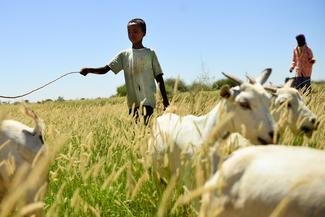
Brick workers in Bavaria around 1900. Photo: Heimatmuseum Vilsbiburg
Maxvorstadt · On the occasion of World Children’s Day, the small exhibition "Factory Child Labor in Bavaria in the 19th Century" will open on Tuesday, September 24, 2 p.m. in the Bavarian State Archives.
Gainful employment of under 14-year-olds was a reality in Bavaria throughout the 19th century, for example in crafts and services, but above all in agriculture. Since the beginning of industrialization, children have also been employed as cheap labor in factories, including brick factories.
The exhibition illuminates this chapter of Bavarian economic and social history under the questions: Which sources provide information about factory child labor in Bavaria? What was the number of children employed in Bavarian factories? In which regions, cities and industries have children been used in factories? What were typical jobs, what were working hours and working conditions? What were the health consequences of factory child labor? How did you try to combine work and schooling? What wages did children get for their work? How did the state and politics, as well as various social groups such as parents, employers, doctors, educators and churches assess children’s factory work??
The exhibits are in chronological order – the first section dates from the 1830s, when the first factories were built in Bavaria, to Foundation of the German Empire, the second section is dedicated to the period after the founding of the Reich. This division into two parts corresponds to legal responsibility: the Kingdom of Bavaria was able to regulate child labor independently on its territory until 1870, after which laws and ordinances of the German Reich applied in Bavaria.
Basically, the employment of children in factories in the 19th century was the first and only form of child labor that was gradually regulated and restricted by the state. However, this in no way meant a ban. It was not until 1903 that the German Reichstag passed a general child protection law, from which agricultural child labor was excluded. Child labor was generally prohibited in the Federal Republic of Germany only through the 1960 Youth Work Protection Act.
The exhibition can be seen until November 7, 2019 in the main building of the Bavarian State Archives (staircase, 1st floor), Schönfeldstrasse 5, 80539 Munich.
Opening times: Monday to Thursday 8.30am to 6.00pm, Friday 8.30am to 1.30pm (closed on weekends and public holidays). Admission is free. Guided tours for groups can be arranged on 089/2 86 38-25 75. The exhibition was developed as part of the training in preparatory service 2017/2020 for entry into the third qualification level of the specialist career in education and science, with a focus on archives, at the University of Public Service in Bavaria.
RELATED ITEMS
-
Child labor: child labor in Europe – human rights – history – planet knowledge
New section on child labor in Europe By Ulla Rehbein / Tobias Aufmkolk Oliver Twist and the pit children in English mines: Many people think of that…
-

Child labor worldwide, world vision germany
On this page we give you an overview of the most important information about child labor and approaches of World Vision…
-
Human rights: child labor – human rights – history – planet knowledge
New section on child labor Knotting carpets by Ulla Rehbein, hewing stones, slaving as house slaves, working in plantations – working all over the world…
-

Child labor – when being a child fails in everyday life
BY JASCHA SCHULZ | 2015-10-29 18:44 Child labor – When being a child fails in everyday life In recent years, the number of working children…
